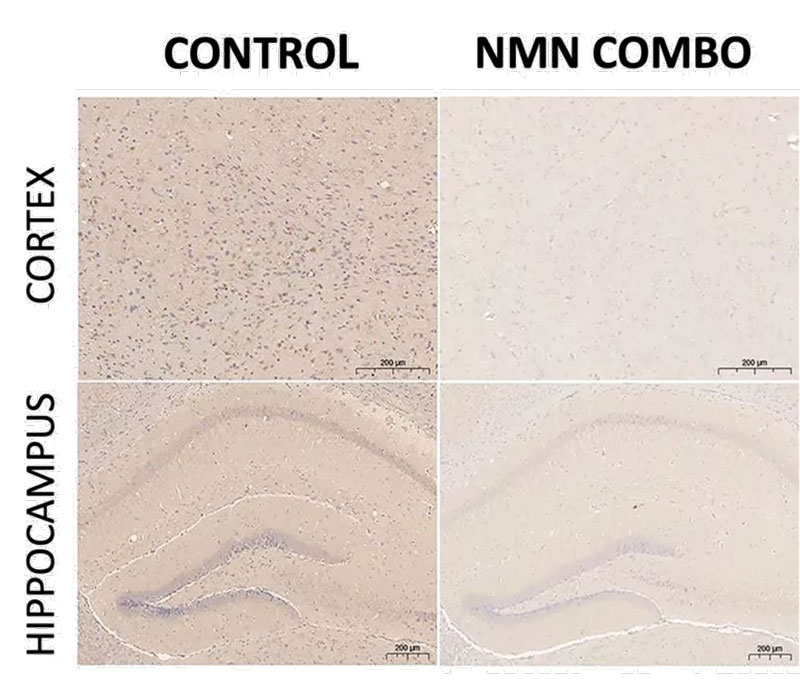
Nov 27, 2024 / Author: China Glutathione suppliers & NMN manufacturers
University of Jinan, China: A combination of NMN, probiotics, and prebiotics can reduce brain plaques in Alzheimer's disease by 67%
The combination of NMN, Lactobacillus plantarum, and lactulose reduces Alzheimer's plaques in brain regions associated with consciousness, thinking, and memory.
Previous research has shown that NMN, L. plantaurum, and lactulose can work synergistically to improve cognition.
In addition to progressive memory loss, cognitive decline, and neurodegeneration, Alzheimer's disease (AD) is characterized by abnormal accumulation of amyloid beta (Aβ) peptides.
These peptides can form plaques in areas of the brain associated with cognition and memory.
Some scientists believe that Aβ plaques drive the progression of AD.
Researchers at the University of Jinan in China have shown that combining NMN, Lactobacillus plantarum, and lactulose reduces Aβ plaque load in mouse models of AD.
They demonstrated this in the cerebral cortex (the brain region associated with consciousness, thinking, and memory) and the hippocampus (the brain region associated with consolidating memories).
Aβ plaque load in the cerebral cortex was reduced by 67 percent, and Aβ plaque load in the hippocampus was reduced by 60 percent.

The NMN combination also reduced inflammation in the colon of AD mice, while improving the absorption capacity of the intestinal wall.
The combination reduced reactive oxygen species (ROS) levels in the colon, cerebral cortex and hippocampus.
Reducing ROS levels reduces oxidative stress, which is a key driver of cellular aging.
These findings suggest that combining NMN, Lactobacillus plantarum, and lactulose can improve AD pathology and intestinal health in mice carrying human AD associated genes (APP/PS1 mice).
According to studies in mice, NMN, L. plantaurum, and lactulose themselves can improve cognitive performance.
Synergies between probiotics and prebiotics and between NMN and prebiotics have also been reported.
With this in mind, the doses of NMN, Lactobacillus plantarum, and lactulose used in the University of Jinan researchers' NMN combination may improve learning and memory in rodents with cognitive impairments.
The NMN Series - The NMN combination contains 300 mg/kg of NMN, which is equivalent to about 170 grams of NMN for a person weighing 1.5 pounds.
Previously, injections of 100 mg/kg of NMN have been shown to improve cognitive performance in AD mice.
Although oral administration reduces the amount of NMN entering the bloodstream, a 300 mg/kg dose may produce similar results for cognition.
Lactobacillus plantarum - L. plantarum is a probiotic that can be purchased as a supplement. The NMN portfolio includes 100 million CFU (colony forming units) of Lactobacillus plantarum.
In a rat model of stress-induced depression, 1 billion CFU of L. plantarum was shown to enhance memory and spatial learning.
Whether a smaller dose of 100 million CFU in the NMM combination can improve memory in rodents with cognitive impairment needs further investigation. However, there may be synergistic effects when probiotics and prebiotics are combined.
This means that in the presence of prebiotics (such as lactulose), fewer probiotics (such as Lactobacillus plantarum) may be needed because their combined effect is greater than the sum of their actions.
This "Biostime" phenomenon may only occur when probiotics can use prebiotics for energy, making certain pairings more effective.
Lactulose - Lactulose is a prebiotic, a non-digestible molecule that feeds beneficial bacteria and is sold and marketed as a laxative.
The NMN combination contains 200mg/kg lactulose. This is the same dose used in a previous study that showed lactulose improved cognitive deficits in a mouse model of AD. For humans, this dose is equivalent to about 1 gram of lactulose.
Doses of up to 2 grams of NMN per day are safe for humans and are safe to take for at least 28 days.
In general, probiotics and prebiotics appear to be safe for human consumption. In addition, all three interventions have been shown to have anti-aging effects in humans, including improved cognitive performance of probiotics.
On the other hand, there is a lack of strong human evidence that NMN and prebiotics can improve cognitive performance. Future research is needed to get closer to the truth.
The cause of AD has not been determined, which has led to an increase in drug failures.
These failures may be due to the fact that most research has focused on drugs that directly target Aβ plaques, which may not be the root cause of AD.
New targets such as the gut microbiome, brain inflammation and oxidative stress may pave the way for treating AD. In addition, taking measures at an early stage can help prevent AD.
Based on epidemiological studies, steps that can be taken to prevent AD include learning new things, socializing, and managing stress.
Diet and exercise can prevent the development of diabetes, obesity and cardiovascular disease, which are all risk factors for AD.
Although not yet studied in humans, taking NMN, probiotics, and prebiotics may help prevent AD.
Li, C., Zhao, X., Xu, H. et al. NMN Synbiotics: A Multifaceted Therapeutic Approach for Alzheimer’s Disease.NeurochemRes(2024). https://doi.org/10.1007/s11064-024-04210-z).
Supplier Introduction: China glutathione supplier and NMN manufacturer GSHworld, the company mainly develops biotechnology and industrialization. As a global pioneer in enzymatic catalytic ATP regeneration technology, our company advocates green production and is committed to providing customers with better and more environmentally friendly products and services. Glutathione Manufacturer,NMN Factory,Citicoline Sodium supplier,China NMN manufacturers
PREVIOUS:Why do I feel energetic after taking NMN?
NEXT:Inventory of NMN latest scientific achievements in 2024
+86-755-23577295
+86 18718790084
Room 832, Building 12, Shenzhen Bay Science and Technology Ecological Park, Yuehai Street, Nanshan District, Shenzhen China